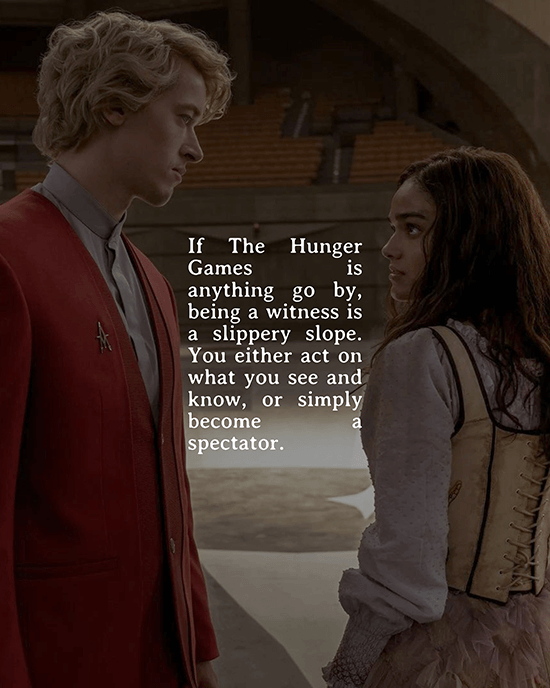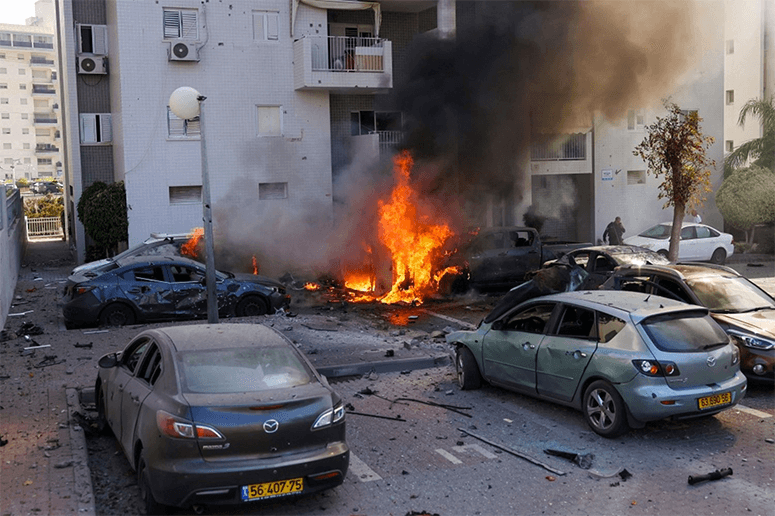When dystopian fiction becomes reality
In 2012, the year of the first Hunger Games film adaptation, viewers quickly noticed parallels to reality, both in history and the present.
In the fictional dystopian nation of Panem, a fascist government treats people as animals, imprisons and enslaves populations, limits their resources, and punishes uprisings and protests against this corruption and oppression.
A clip of Katniss Everdeen (Jennifer Lawrence) from the third movie, Mockingjay Part 1, has been referenced online often: “I have a message for President Snow: You can bomb us, and torture us, and burn our districts to the ground. But do you see that? Fire is catching. And if we burn, you burn with us.”

Author Suzanne Collins explained to the New York Times in 2018 that she drew references from real life: “I was flipping through the channels one night between reality television programs and actual footage of the Iraq War, when the idea came to me.” Four movies later, the franchise still accurately mimics reality. With the timely release of The Ballad of Songbirds and Snakes, the prequel that explores President Snow’s past, audiences liken the inhumane conditions in Panem to Israel’s illegal occupation of Palestine.
Before he was a tyrannical dictator, Coriolanus Snow was an overachieving Academy student. For their final project, which would get Snow closer to the monetary prize his family needs, each top student is assigned a district tribute they will mentor before The Hunger Games. To convince people to watch the Games and make it relevant again, Snow suggests using sympathy to get people to sponsor and bet on the tributes. As Academy dean Casca Highbottom put it: “Your role is to turn these people into spectacles, not survivors.”
Two dozen teenagers who will fight for their lives in an arena had to humanize themselves to get people to care. The people of the Capitol, the powerful city of Panem, did care enough to watch and get to know these helpless teenagers, but not enough to stop the Games. And as we can learn from history, dystopian fiction is also a cautionary tale. Amid the current news cycle and online discourse about Israel’s siege of the Gaza Strip, three Palestinians, namely Plestia Alaqad, Bisan Owda, and Motaz Azaiza, have offered firsthand accounts and documentation through their social media accounts.

On Oct. 7, armed Palestinian group Hamas launched an attack on Israel, killing more than 800 Israelis. (It’s important to mention that Israel’s occupation of Palestine goes back as early as 1948). Since then, Israel has launched bombing campaigns and airstrikes in the densely-populated Gaza Strip, stopped their food and fuel supply, and killed more than 11,000 people. Under international laws, these are war crimes.
On Nov. 27, the fourth day of the truce between Israel and Hamas, Bisan updated her Instagram followers that there is no fuel or transportation available to them: “We’re still alive,” she begins, as she does with many of her videos. “Many people refuse to go back to the shelters from their homes because they find that the shelters are so miserable, and they prefer to die rather than stay in suites at the hospitals.”
In an Instagram story on Nov. 26, Motaz shared a photo of him with a young girl who lost her leg. He said that her other leg was broken and that some of her family members lost their lives. “She keeps asking her mom to get her leg back to her,” he wrote.
? 'This war has claimed the lives of more children in a shorter time and with a level of brutality that we have not witnessed in recent decades'
— Anadolu English (@anadoluagency) November 20, 2023
⏩ UN Committee on the Rights of the Child says it marked Monday, Nov. 20, World Children’s Day, in a 'sombre mood' due to the… pic.twitter.com/onHWJ5PLwk
On Nov. 20, globally recognized as International Children’s Day, Motaz wrote under a photo he captured of children in the Gaza Strip: “More than 6,000 Palestinian (children) got killed in the last 43 days by the Israeli army. Thousands more lost their entire family, parents, and their loved ones.”
These days, everyone is trying to write about the children. An incomprehensible number of them dead and counting. We are up at night, combing through the flickering light of our phones, trying to find the metaphor, the clip, the photograph to prove a child is a child.
Before Plestia fled Gaza, she posted a series of videos on Nov. 23 explaining how hard it was for her to leave her homeland, but it was for the safety of her family. “I hope we get to work together again and instead of reporting the genocide and forced displacement of our people, we get to report the beauty of Gaza,” she wrote under a post dedicated to Mohammed and Hatem, fellow Palestinians she worked with and saw more than her own family.
In a post from Nov. 12, the 37th day of Israel’s siege, Plestia admitted that she felt hopeless. “Reporting and posting about Gaza, Palestine feels pointless. It feels like I’m posting movie scenes for people to watch and whenever they get bored, they watch something else,” she wrote. “I’ll never forgive anyone who has (the) power to take action and stop what’s happening, (but) is just watching silently.”
Dr. Hala Alyan, a Palestinian-American writer and psychologist, wrote in a New York Times guest essay on Oct. 25 that it is as though Palestinians are now forced to perform for empathy, even under oppression and displacement. “The task of the Palestinian is to be palatable or to be condemned. The task of the Palestinian, we’ve seen in the past two weeks, is to audition for empathy and compassion. To prove that we deserve it. To earn it.”
“These days, everyone is trying to write about the children. An incomprehensible number of them dead and counting. We are up at night, combing through the flickering light of our phones, trying to find the metaphor, the clip, the photograph to prove a child is a child.”
While their firsthand coverage has helped people understand, we can’t let it become a spectacle that we can easily scroll past and desensitize ourselves from. Palestinians have been brave to risk their lives by sharing the truth. It would be cowardly of us if we were to turn away our eyes, our ears, and our help. If The Hunger Games is anything to go by, being a witness is a slippery slope. You either act on what you see and know, or simply become a spectator.
* * *
The Philippines-Palestine Friendship Association is currently accepting financial and in-kind donations for our Filipino and Palestinian repatriates from Gaza. More information is on their Facebook.


